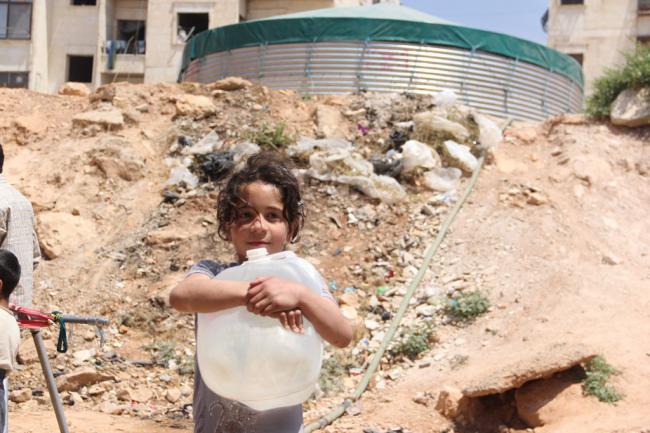
UNICEF helps children threatened by water cuts in Aleppo
“These water cuts came at the worst possible time, while Syrians are suffering in an intense summer heat wave,” said UNICEF Representative in Syria Hanaa Singer.
She said, “Some neighbourhoods have been without running water for nearly three weeks, leaving hundreds of thousands of children thirsty, dehydrated and vulnerable to disease.”
In some cases deliberately implemented by parties to the conflict, the disruption to piped water supplies increased the risk of water-borne disease especially among children.
Indeed, since the beginning of July alone, 41 per cent of children attending UNICEF-backed clinics in Aleppo governorate – 3,000 in all – reported mild cases of diarrhoea.
“We remain concerned that water supplies in Aleppo could be cut again any time adding to what is already a severe water crisis throughout the country,” warned Singer.
UNICEF reminds parties to the conflict to refrain from attacking or deliberately interrupting water supplies, treatment and distribution systems, acts which are prohibited under international Humanitarian law, points out a press release issued today.
To address the crisis, and despite the ongoing violence in the city, UNICEF has trebled the scale of its water trucking services from 800,000 to 2.5 million liters a day, the largest volume of water delivered since the start of the conflict.
The service provides 15 liters of water per person daily to nearly 200,000 people in some of the hardest-hit communities in Aleppo.
But UNICEF is working “around the clock” to provide a longer-term solution in cooperation with partners.
The water trucking service has been complemented by the drilling of 50 ground water wells that can provide up to 16 million liters of water per day.
In addition, UNICEF is developing an infiltration well, close to Aleppo City’s Kwaik River, to enhance the provision of water by more than ten-fold of a regular groundwater well.
Despite these efforts, an estimated 500,000 people in Aleppo are still struggling to receive enough water to survive, the agency acknowledged.
To address the rising incidence of water-borne illness, UNICEF has delivered diarrhoea kits sufficient to treat more than 18,000 children.
And in anticipation of further water shortages and to prevent disease outbreaks, the Fund, through its partners, is distributing water purification tablets for up to 1 million people.
Across the country, the agency is working with partners to support the vital water infrastructure on which some 15 million people in Syria depend, equipping wells and supporting procurement and distribution of water treatment supplies.
Photo: UNICEF/Razan Rashidi
Support Our Journalism
We cannot do without you.. your contribution supports unbiased journalism
IBNS is not driven by any ism- not wokeism, not racism, not skewed secularism, not hyper right-wing or left liberal ideals, nor by any hardline religious beliefs or hyper nationalism. We want to serve you good old objective news, as they are. We do not judge or preach. We let people decide for themselves. We only try to present factual and well-sourced news.







